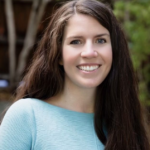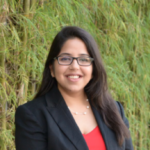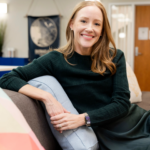 Brandie Nonnecke, Co-Founder and Director
Brandie Nonnecke, Co-Founder and Director
nonnecke@citris-uc.org | @BNonnecke
Brandie Nonnecke, PhD, is the Founding Director of the CITRIS Policy Lab and a Technology and Human Rights Fellow at the Carr Center for Human Rights Policy at the Harvard Kennedy School. More info.

Photo Credit: Bob Margot
Hany Farid, Professor, Electrical Engineering & Computer Science and the School of Information, UC Berkeley
Hany Farid is a Professor at the University of California, Berkeley with a joint appointment in Electrical Engineering & Computer Science and the School of Information. His research focuses on digital forensics, image analysis, and human perception. Farid is the recipient of an Alfred P. Sloan Fellowship, a John Simon Guggenheim Fellowship, and is a Fellow of the National Academy of Inventors. More info.
 Lise Getoor, Professor, Computer Science & Engineering Department and Director of Data, Discovery & Decisions (D3) Research Center, UC Santa Cruz
Lise Getoor, Professor, Computer Science & Engineering Department and Director of Data, Discovery & Decisions (D3) Research Center, UC Santa Cruz
@lgetoor
Lise Getoor is a Professor in the Computer Science & Engineering Department at UC Santa Cruz and founding Director of the UC Santa Cruz Data Science Research Center. She has over 250 publications, including 13 best paper awards, and is Fellow of the ACM and AAAI. She teaches both an undergraduate Ethics & Algorithms class and a graduate Responsible Data Science course. Her research areas include machine learning and reasoning under uncertainty, with a focus on graph and network data. More info.
 Ken Goldberg, Professor, Industrial Engineering and Operations Research
Ken Goldberg, Professor, Industrial Engineering and Operations Research
William S. Floyd Jr. Distinguished Chair in Engineering, UC Berkeley
@ken_goldberg
Ken Goldberg is an artist, inventor, and UC Berkeley Professor focusing on robotics. He was appointed the William S. Floyd Jr. Distinguished Chair in Engineering and serves as Chair of the Industrial Engineering and Operations Research Department. Ken is Director of the CITRIS “People and Robots” Initiative and the UC Berkeley AUTOLAB where he and his students pursue research in machine learning for robotics and automation in warehouses, homes, and operating rooms. He has over 250 peer-reviewed publications and 8 U.S. Patents. More info.
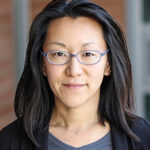 Elizabeth Joh, Professor of Law, UC Davis
Elizabeth Joh, Professor of Law, UC Davis
@elizabeth_joh
Elizabeth Joh is a Professor at the University of California, Davis. She has written widely on policing, technology, and surveillance. More info.
 Sonia Katyal, Distinguished Haas Professor and Chancellor’s Professor of Law; Co-Director, Berkeley Center for Law & Technology, UC Berkeley
Sonia Katyal, Distinguished Haas Professor and Chancellor’s Professor of Law; Co-Director, Berkeley Center for Law & Technology, UC Berkeley
Sonia Katyal is the Chancellor’s Professor of Law at University of California, Berkeley School of Law and Faculty Co-Director, Berkeley Center for Law and Technology. Her scholarly work focuses on intellectual property, art law, civil rights (including gender, race and sexuality), property theory, and technology/new media. More info.
 Martin Kenney, Professor, Community and Regional Development, UC Davis
Martin Kenney, Professor, Community and Regional Development, UC Davis
Martin Kenney is a Professor in Community and Regional Development at the University of California, Davis; a Senior Project Director at the Berkeley Roundtable on the International Economy; and Senior Fellow at the Research Institute for the Finnish Economy. He has co-authored or edited seven books and 150 scholarly articles on industrial clusters, entrepreneurship, venture capital, innovation, university-industry relations, and value chain upgrading. More info.
 Pamela Samuelson, Richard M. Sherman Distinguished Professor of Law, Berkeley Law; Co-Director, Berkeley Center for Law & Technology, UC Berkeley
Pamela Samuelson, Richard M. Sherman Distinguished Professor of Law, Berkeley Law; Co-Director, Berkeley Center for Law & Technology, UC Berkeley
@PamelaSamuelson
Pamela Samuelson is the Richard M. Sherman Distinguished Professor of Law and Information at the University of California, Berkeley. She is recognized as a pioneer in digital copyright law, intellectual property, cyberlaw and information policy. More info.
 Erik Stallman, Assistant Clinical Professor of Law, UC Berkeley
Erik Stallman, Assistant Clinical Professor of Law, UC Berkeley
@ErikStallman
Erik Stallman is an Assistant Clinical Professor of Law and Associate Director of the Samuelson Law, Technology & Public Policy Clinic. He is also a Faculty Co-Director of the Berkeley Center for Law & Technology. His primary interests are regulation of access to information and open internet issues. More info.
 Laura Tyson, Distinguished Professor and Former Dean, Haas School of Business, UC Berkeley
Laura Tyson, Distinguished Professor and Former Dean, Haas School of Business, UC Berkeley
Laura Tyson is Distinguished Professor of Business Administration and Economics, and a Former Dean, at the Haas School of Business and London Business School. An expert on trade and competitiveness, she served as Chair of the President’s Council of Economic Advisers and later as Director of the White House National Economic Council. She was the first woman to serve in these two positions. More info.
 Lisa Yeo, Assistant Professor of Management, Ernest & Julio Gallo Management Program, UC Merced
Lisa Yeo, Assistant Professor of Management, Ernest & Julio Gallo Management Program, UC Merced
@sdamask
M. Lisa Yeo is an Assistant Professor at the University of California, Merced. With the perspective that information security can add value, she is interested in research that leads to better business and policy decisions regarding the protection of information. More info.
 John Zysman, Professor Emeritus, Political Science, UC Berkeley
John Zysman, Professor Emeritus, Political Science, UC Berkeley
John Zysman is Professor Emeritus of Political Science at UC Berkeley. He has written extensively on European and Japanese policy and corporate strategy; his interests also include comparative politics, Western European politics, and political economy. He is Co-Director of the Berkeley Roundtable on the International Economy (BRIE). More info.
 Jennifer M. Granholm, Distinguished Adjunct Professor at Berkeley Law & Goldman School of Public Policy, Former Governor of the state of Michigan
Jennifer M. Granholm, Distinguished Adjunct Professor at Berkeley Law & Goldman School of Public Policy, Former Governor of the state of Michigan
Jennifer Mulhern Granholm is a Canadian-American politician, lawyer, educator, author, political commentator serving as the 16th United States Secretary of Energy. A member of the Democratic Party, she served as the Attorney General of Michigan from 1999 to 2003 and as the Governor of Michigan from 2003 to 2011. In January 2017, she became a CNN political contributor. More info.
AFFILIATED SCHOLARS & PRACTITIONERS
Affiliated scholars and practitioners are not necessarily in residence at CITRIS but collaborate with the CITRIS Policy Lab on a focused project.
 Camille Carlton, Policy, Research, & Communications Associate in Tech Governance, Berkeley Roundtable on the International Economy (BRIE)
Camille Carlton, Policy, Research, & Communications Associate in Tech Governance, Berkeley Roundtable on the International Economy (BRIE)
Camille is a Policy, Research, and Communications Associate in Technology Governance at the Berkeley Roundtable on the International Economy (BRIE). She is interested in the social and economic implications of technology, particularly around information integrity and digital discourse; power and justice; and shared prosperity. Through the CITRIS Policy Lab, Camille is studying the effects of nascent laws proposed in the EU and US on third party data access for research. Previously, Camille led marketing at fintech and healthtech companies. Camille has an MSc from the London School of Economics and Political Science (LSE) and a B.A. from Northeastern University. More info.
 Louise Comfort, Professor, University of Pittsburgh & Lecturer, UC Berkeley
Louise Comfort, Professor, University of Pittsburgh & Lecturer, UC Berkeley
@CDM_Louise
Recipient of 2019 CITRIS Seed Funding for “Cognition to Action in Extreme Events: Policy Interventions for Disaster Risk Reduction”
Louise K. Comfort is Professor of Public and International Affairs and Past Director, Center for Disaster Management, University of Pittsburgh, and Lecturer, Department of Political Science, University of California, Berkeley. She is a Fellow of the National Academy of Public Administration and recipient of the 2016 Distinguished Citizen Award from Macalester College, St. Paul, Minnesota. Her primary research interests are in decision making under conditions of uncertainty and rapid change, interactions among technical and organizational systems under stress, and uses of information technology to develop decision support systems for managers operating under urgent conditions. In June 2019, she published The Dynamics of Risk: Changing Technologies and Collective Action in Seismic Events through Princeton University Press.

Marc Faddoul, Associate Researcher, School of Information, UC Berkeley
@MarcFaddoul
Marc Faddoul is an artificial intelligence expert, with a focus on algorithmic fairness and socio-technical issues. He has developed computational methods to analyze and audit social media recommendation algorithms. His work is regularly featured in the news, including in the New York Times, the BBC, le Monde and the Brookings Institution. After graduating with an engineering diploma and an MS in Data Science from France’s top Computer Science school, he worked as an algorithm designer in two Parisian AI start-ups. To develop more transdisciplinary insights, Marc Faddoul joined the UC Berkeley School of Information where he obtained a second Master’s degree before becoming a full-time Associate Researcher.
 Marci Harris, CEO and Co-Founder, POPVOX
Marci Harris, CEO and Co-Founder, POPVOX
@POPVOX | CITRIS Research Exchange Presentation
Marci Harris is co-founder and CEO of POPVOX an online platform for legislative information, civic engagement, and tools for policymakers. A former Congressional staffer and lawyer, Marci says that her “first startup was a town,” as she led Jackson, TN’s rebuilding efforts following a 2003 tornado. In 2018, she led the People-Centered Internet’s work on “Digital Puerto Rico” policy recommendations for the island’s Recovery Plan. She was named a 2012 Fast Company Top 100 Most Creative People in Business and was an inaugural Technology and Democracy Fellow at the Harvard Kennedy School’s Ash Center and a New America California fellow. Marci holds a B.A. in International Relations from Franklin University in Lugano, Switzerland; a J.D from the University of Memphis; and an LL.M. from the American University Washington College of Law.

Tom Maiorana, Assistant Professor, Design, UC Davis
@TMaiorana
Recipient of 2019 CITRIS Seed Funding for “Cognition to Action in Extreme Events: Policy Interventions for Disaster Risk Reduction”
Tom Maiorana is an assistant professor in the Department of Design at UC Davis and the co-founder of the Product Design Lab at UC Davis. Tom specializes in product design and development, design thinking, and prototyping. His research explores the ways which low-resolution prototypes can be used to create human-centered, complex systems. He is a fellow at the John Muir Institute for the Environment and the co-architect of the OneClimate initiative.
 Jessica Newman, Program Lead of the AI Security Initiative, Center for Long-Term Cybersecurity, UC Berkeley
Jessica Newman, Program Lead of the AI Security Initiative, Center for Long-Term Cybersecurity, UC Berkeley
@JessicaH_Newman
Jessica Newman is a Research Fellow at the UC Berkeley Center for Long-Term Cybersecurity, where she leads the AI Security Initiative, a hub for interdisciplinary research on the global security impacts of artificial intelligence. She is also an AI Policy Specialist with the Future of Life Institute and a Research Advisor with The Future Society. Jessica was a 2016-17 International and Global Affairs Student Fellow at Harvard’s Belfer Center, and has held research positions with Harvard’s Program on Science, Technology & Society, the Institute for the Future, and the Center for Genetics and Society. Jessica received her master’s degree in public policy from the Harvard Kennedy School and her bachelor’s degree in anthropology from the University of California, Berkeley with highest distinction honors. She has published dozens of articles on the implications of emerging technologies, and is a member of the CNAS AI Task Force and the Partnership on AI Expert Group on Fair, Transparent, and Accountable AI.
 Shannon Pierson, Public Interest Cybersecurity Fellow, UC Berkeley’s Center for Long-Term Cybersecurity
Shannon Pierson, Public Interest Cybersecurity Fellow, UC Berkeley’s Center for Long-Term Cybersecurity
LinkedIn
Shannon Pierson is currently the Public Interest Cybersecurity Fellow at UC Berkeley’s Center for Long-Term Cybersecurity (CLTC), where she produces research and advocates for bolstering the cybersecurity of public-serving organizations, including hospitals, cities, nonprofits, and utilities. Her work focuses on secure-by-design principles, K-12 cybersecurity, cyber equity, and responsible AI governance for the public sector. Previously, she worked on cyber threat intelligence for election integrity projects at Meta and for Microsoft, and authored a report directed at UK lawmakers on extended reality technology’s platform governance and biometric data privacy challenges at the Minderoo Centre for Technology & Democracy. Shannon also studied online harassment campaigns and foreign influence operations at the Wilson Center and the German Marshall Fund. During a U.S. State Department fellowship in Germany, she advised on developing a model to identify multimodal hate speech at the Helmholtz Center for Information Security. Her research has been published by the University of Cambridge, IEEE, the Wilson Center, and Disability & Society.
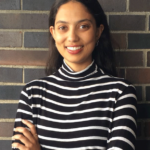 Gireeja Ranade, Assistant Teaching Professor, EECS, UC Berkeley
Gireeja Ranade, Assistant Teaching Professor, EECS, UC Berkeley
Recipient of 2019 CITRIS Seed Funding for “Bots and Misinformation on Facebook: Prevalence, Activity, and Effects”
Before joining the faculty at UC Berkeley, Dr. Ranade was a researcher at Microsoft Research AI in the Adaptive Systems and Interaction Group. She also designed and taught the first offering for the new course sequence EECS16A and EECS16B in the EECS department at UC Berkeley and received the 2017 UC Berkeley Electrical Engineering Award for Outstanding Teaching.
 Kenichi Soga, Chancellor’s Professor, Civil and Environmental Engineering, UC Berkeley
Kenichi Soga, Chancellor’s Professor, Civil and Environmental Engineering, UC Berkeley
Recipient of 2019 CITRIS Seed Funding for “Cognition to Action in Extreme Events: Policy Interventions for Disaster Risk Reduction”
Kenichi Soga was a professor of civil engineering at the University of Cambridge before joining UC Berkeley in 2016. He has published more than 350 journal and conference papers. His current research activities are infrastructure sensing, performance-based design and maintenance of underground structures, energy geotechnics, and geotechnics from micro to macro. He is a Fellow of the UK Royal Academy of Engineering and a Fellow of the Institution of Civil Engineers. He is the recipient of many awards including George Stephenson Medal and Telford Gold Medal from the Institution of Civil Engineers and Walter L. Huber Civil Engineering Research Prize from the American Society of Civil Engineers.
 Magdalena Wojcieszak, Associate Professor, Communication, UC Davis
Magdalena Wojcieszak, Associate Professor, Communication, UC Davis
Recipient of 2019 CITRIS Seed Funding for “Bots and Misinformation on Facebook: Prevalence, Activity, and Effects”
Before joining UC Davis, Magdalena was an associate professor of political communication at Amsterdam School of Communication Research, University of Amsterdam. Wojcieszak’s research focuses on how people select political information in the current media environment and on the effects of these selections on attitudes, cognitions, and behaviors. She is the PI of an ERC Starting Grant ($1,7500,000) and two other grants that examine ways to minimize selective exposure and biased information processing. Wojcieszak serves as an Associate Editor of Journal of Communication and on editorial boards of six other journals.
 Sam Woolley, Assistant Professor, School of Journalism, University of Texas at Austin
Sam Woolley, Assistant Professor, School of Journalism, University of Texas at Austin
@samuelwoolley | CITRIS Research Exchange Presentation
Samuel is an assistant professor in the Moody College of Communication in the School of Journalism at the University of Texas at Austin, a research associate at the Oxford Internet Institute, and an associate member of Green Templeton College at the University of Oxford. He specializes in the study of automation/AI, political communication, and information warfare. He is also a co-founder and former research director of the Computational Propaganda (ComProp) research team at the University of Oxford and the University of Washington. He and his collaborators have done foundational research on the topics of online disinformation and political manipulation, coining the terms ‘computational propaganda’ and ‘political bot.’
 Felix Wu, Professor, Computer Science, UC Davis
Felix Wu, Professor, Computer Science, UC Davis
Recipient of 2019 CITRIS Seed Funding for “Bots and Misinformation on Facebook: Prevalence, Activity, and Effects”
Professor Wu’s research focuses on social computing, information search and analytics, cyber security, Internet architecture and protocols.
Visiting scholars are in residence at CITRIS for at least 4 weeks and collaborate with the CITRIS Policy Lab on a focused research project. See VSPA for more info.
 Brian Christian, Non-Fiction Author & Poet
Brian Christian, Non-Fiction Author & Poet
Brian Christian is the author of The Most Human Human, which was named a Wall Street Journal bestseller, a New York Times Editors’ Choice, and a New Yorker favorite book of the year. He is the author, with Tom Griffiths, of Algorithms to Live By, a #1 Audible bestseller, Amazon best science book of the year and MIT Technology Review best book of the year.
Christian’s writing has been translated into nineteen languages, and has appeared in The New Yorker, The Atlantic, Wired, The Wall Street Journal, The Guardian, The Paris Review, and in scientific journals such as Cognitive Science. Christian has been featured on The Daily Show with Jon Stewart, Radiolab, and The Charlie Rose Show, and has lectured at Google, Facebook, Microsoft, the Santa Fe Institute, and the London School of Economics. His work has won several awards, including fellowships at Yaddo and the MacDowell Colony, publication in Best American Science & Nature Writing, and an award from the Academy of American Poets.
 Brandie Nonnecke, Co-Founder and Director
Brandie Nonnecke, Co-Founder and Director 




 Lise Getoor, Professor, Computer Science & Engineering Department and Director of Data, Discovery & Decisions (D3) Research Center, UC Santa Cruz
Lise Getoor, Professor, Computer Science & Engineering Department and Director of Data, Discovery & Decisions (D3) Research Center, UC Santa Cruz Ken Goldberg, Professor, Industrial Engineering and Operations Research
Ken Goldberg, Professor, Industrial Engineering and Operations Research Elizabeth Joh, Professor of Law, UC Davis
Elizabeth Joh, Professor of Law, UC Davis Sonia Katyal, Distinguished Haas Professor and Chancellor’s Professor of Law; Co-Director, Berkeley Center for Law & Technology, UC Berkeley
Sonia Katyal, Distinguished Haas Professor and Chancellor’s Professor of Law; Co-Director, Berkeley Center for Law & Technology, UC Berkeley Martin Kenney, Professor, Community and Regional Development, UC Davis
Martin Kenney, Professor, Community and Regional Development, UC Davis  Deirdre Mulligan, Professor, School of Information and School of Law (by courtesy), UC Berkeley
Deirdre Mulligan, Professor, School of Information and School of Law (by courtesy), UC Berkeley Pamela Samuelson, Richard M. Sherman Distinguished Professor of Law, Berkeley Law; Co-Director, Berkeley Center for Law & Technology, UC Berkeley
Pamela Samuelson, Richard M. Sherman Distinguished Professor of Law, Berkeley Law; Co-Director, Berkeley Center for Law & Technology, UC Berkeley Erik Stallman, Assistant Clinical Professor of Law, UC Berkeley
Erik Stallman, Assistant Clinical Professor of Law, UC Berkeley Laura Tyson, Distinguished Professor and Former Dean, Haas School of Business, UC Berkeley
Laura Tyson, Distinguished Professor and Former Dean, Haas School of Business, UC Berkeley Lisa Yeo, Assistant Professor of Management, Ernest & Julio Gallo Management Program, UC Merced
Lisa Yeo, Assistant Professor of Management, Ernest & Julio Gallo Management Program, UC Merced John Zysman, Professor Emeritus, Political Science, UC Berkeley
John Zysman, Professor Emeritus, Political Science, UC Berkeley Jennifer M. Granholm, Distinguished Adjunct Professor at Berkeley Law & Goldman School of Public Policy, Former Governor of the state of Michigan
Jennifer M. Granholm, Distinguished Adjunct Professor at Berkeley Law & Goldman School of Public Policy, Former Governor of the state of Michigan Camille Carlton, Policy, Research, & Communications Associate in Tech Governance, Berkeley Roundtable on the International Economy (BRIE)
Camille Carlton, Policy, Research, & Communications Associate in Tech Governance, Berkeley Roundtable on the International Economy (BRIE)



 Jessica Newman, Program Lead of the AI Security Initiative, Center for Long-Term Cybersecurity, UC Berkeley
Jessica Newman, Program Lead of the AI Security Initiative, Center for Long-Term Cybersecurity, UC Berkeley  Shannon Pierson, Public Interest Cybersecurity Fellow, UC Berkeley’s Center for Long-Term Cybersecurity
Shannon Pierson, Public Interest Cybersecurity Fellow, UC Berkeley’s Center for Long-Term Cybersecurity Gireeja Ranade, Assistant Teaching Professor,
Gireeja Ranade, Assistant Teaching Professor,  Kenichi Soga, Chancellor’s Professor, Civil and Environmental Engineering, UC Berkeley
Kenichi Soga, Chancellor’s Professor, Civil and Environmental Engineering, UC Berkeley

 Felix Wu, Professor, Computer Science, UC Davis
Felix Wu, Professor, Computer Science, UC Davis






